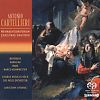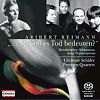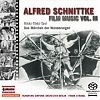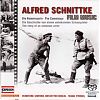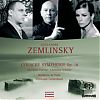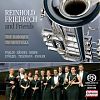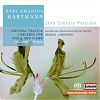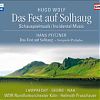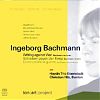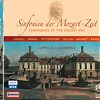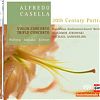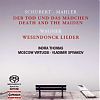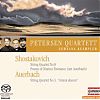sacd-hybrid

ALFRED SCHNITTKE Film Music Vol.2
Frank Strobel
Clowns und Kinder (1976) · Der Walzer (1969)
Die Glasharmonika (1968) · Der Aufstieg (1976)
Augezeichnet!: Preis der Deutschen Schallplattenkritik
Auch wenn Alfred Schnittke die im doppelten Sinn sein Leben unterhaltende Musik zu mehr als 60 Filmen komponiert hat, soll nicht länger verwundern, was musikwissenschaftliche Herablassung zunächst nicht glauben mochte: Die Filmmusik offenbart vieles, im Grunde alles, was Alfred Schnittkes Musik auszeichnet. Ja, sie fügt sich mit den Sinfonien, Konzerten, Kammermusik- und Chorwerken sowie den Opern zu einem faszinierenden Ganzen seiner musikalischen Persönlichkeit. Schnittkes Figuren glänzen nicht wie Helden aus Stahl und Glas, sondern sie irren, lachen und triumphieren, wie Menschen es halt tun. Das hat ihn vorm Elfenbeinturm bewahrt, in welchen nicht wenige Komponisten des 20. Jahrhunderts wie die Lemminge eingezogen sind.
„Schnittke hat in seinen Filmmusiken viel ausprobiert und weiterentwickelt. Man muss sich vorstellen, dass er für jeden Film einen Score mit einer durchschnittlichen Länge von 45 bis 60 Minuten geschaffen hat. Das ist eine enorme kompositorische Leistung, die ich ohne Zögern an die Seite seiner Concerti grossi, Sinfonien und weiteren Werke stellen möchte.“ (Frank Strobel)
Although Alfred Schnittke wrote the music for more than 60 films, music that supported his life in more than one sense, we should no longer be surprised at what musicological arrogance did not want to believe at first: This film music reveals much, if not practically everything that distinguishes Alfred Schnittke’s music, contributing to the fascinating whole of his musical character together with his symphonies, concertos, chamber and vocal music as well as the operas. Schnittke’s protagonists are not shining like heroes made of steel and glass. Instead, they are mistaken, laugh and triumph, as people do. This is what kept him from the ivory tower into which many of the composers in the 20th century moved like lemmings.
“Schnittke experimented a lot in his film music and continued the development of certain elements. One has to imagine that he wrote a score for each film that is, on average, of 45 to 60 minutes’ duration. This is a great compositional achievement that I would not hesitate to place next to his concerti grossi, symphonies and other works.” (Frank Strobel)



